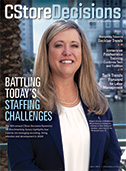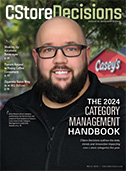Managing the Front Line
THE CONVENIENCE STORE INDUSTRY has come a long way over the past decade in terms of recruiting, training and retaining great employees. But the results of the ninth annual Convenience Store Industry Human Resources Survey indicate there’s still quite a bit of work to be done.
Among the survey’s key findings is that industry turnover is on the rise and recruiting managers remain frustrated with the onerous process of finding good employees. The survey, conducted jointly by human resources expert Mel Kleiman, of Humetrics, and CSD, found once again that paying higher wages isn’t nearly as important as respecting and recognizing the hard work employees put forth daily.
This is a powerful message that shows if you’re simply trying to throw money at employees in the hopes of creating a great corporate culture, it simply won’t work. There will always be someone else who can offer more money or a better opportunity. Without that personal relationship with your employees, loyalty is fleeting.
The byproduct of a great relationship with your employees is that you are incrementally building the foundation of an outstanding corporate culture. An organization that has built its reputation on this key component has distinct advantages. For starters, a world-class corporate culture is contagious.
When good people want to work for you, the recruiting process is easier, human resources costs often go down and the overall quality of your brand goes up. There really is no downside.
In fact, Harvard University professor James L. Heskett once said that culture “can account for 20-30% of the differential in corporate performance when compared with ‘culturally unremarkable’ competitors.” This applies to convenience stores as much as it does the Targets, McDonald’s and Amazons of the world.
GETTING TO WORK
A joint study by the Disney Institute and McKinsey & Company found that creating a memorable customer experience was “not magic, but method.”
The study revealed that when you take an active role in making your employees feel needed, they become more engaged with your organization and more committed to your service goals. It recommended companies adopt four habits to accomplish this.
Listen to employees. If you want your employees to take good care of your customers, start by taking good care of your employees. But go a step further and get personally involved in their needs. Then take action. Communicate what you are doing and how long it will take, and involve the employees themselves in the solution.
Hire for attitude. If you want friendly service, hire friendly people. As Jonathan Ketchum, senior vice president of retail at Alon Brands, said in this month’s cover story, “the key for us was to focus on attitude and train for the skills we need at retail.” Think about companies like Southwest, Disney, Apple or any company known for its company culture. They aren’t trying to change people to fi t what they are doing. They are putting in individuals whose attitudes fi t what they do, and then they train them on the necessary job skills. The end result is quite noticeable.
Give people purpose, not rules. Front-line employees participating in infinitely varied customer interactions won’t always find the answers in manuals. The best companies supply front-line staff with common purpose backed by clear quality standards. When people are trusted to do their job and given clear expectations rather than an instruction manual, they feel more valued and empowered.
Tap into the creativity of your staff. Giving front-line employees responsibility and autonomy creates a sense of ownership that inspires them to do everything they can to improve the customer experience.
I was speaking with a corporate HR manager recently who was clearly frustrated with high turnover and blamed today’s younger generation with a poor work ethic. This seemed to me the easy way out. If staffi ng is your problem, take the time to look in the mirror and identify the root cause of your frustration. It will be the fi rst step down the path to better days.




